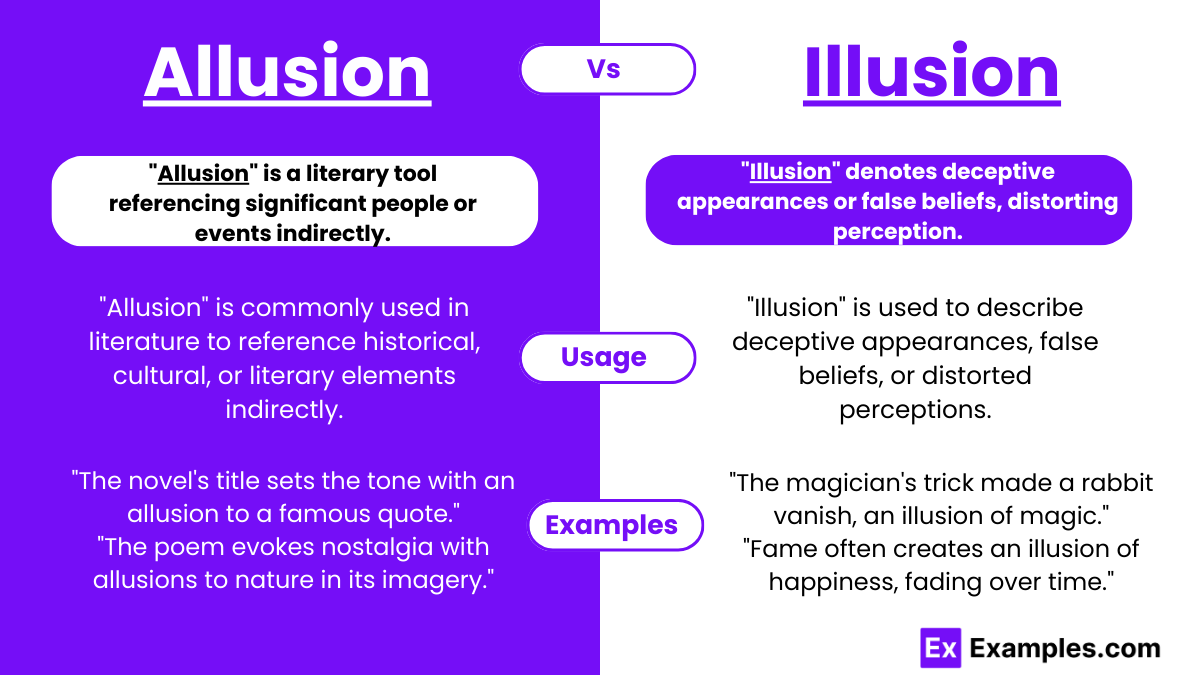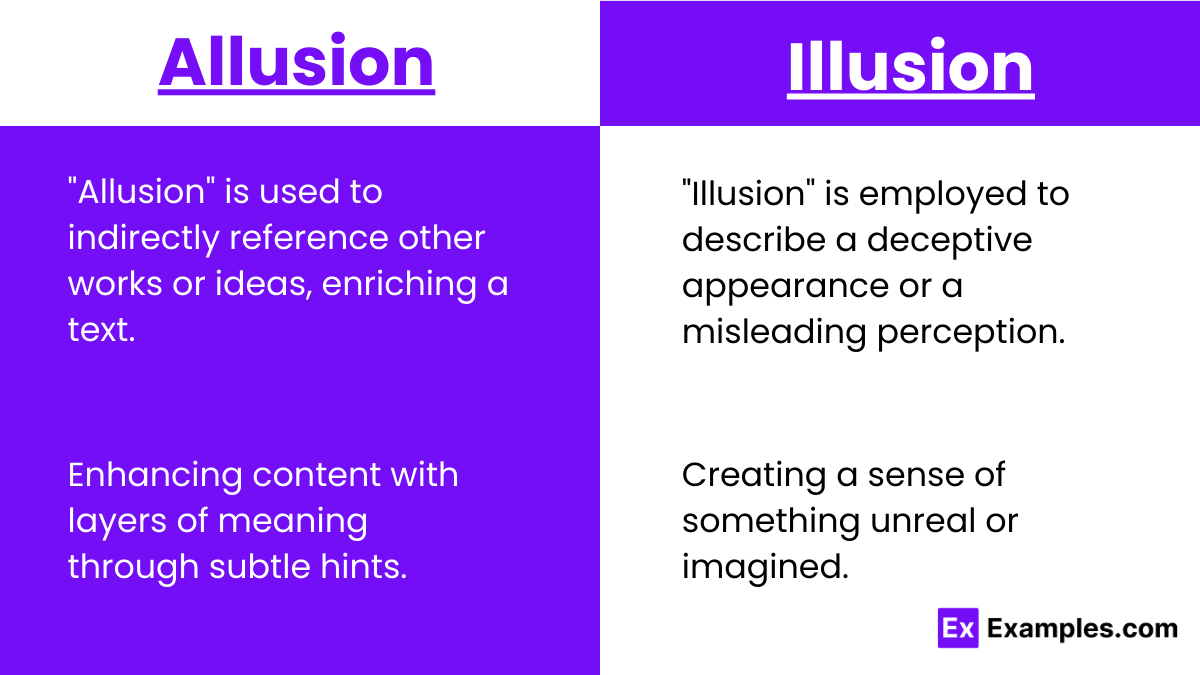Allusion vs Illusion – Examples, Differences, Usage, Tips
An exploration of “Allusion” vs. “Illusion” unveils a captivating facet of the English language, where two seemingly similar words hold entirely distinct meanings. “Allusion,” a subtle nod or reference, often finds its place in the rich tapestry of literature, allowing writers to hint at broader concepts or works without explicit mention. This technique enriches texts, offering depth and interconnectedness that invites readers to engage more deeply with the content.
Conversely, “Illusion” plays on the realms of perception and reality, crafting a facade that challenges our understanding of the tangible world. Whether in the domain of magic, psychology, or philosophy, illusions captivate our imagination by blurring the lines between what is real and what merely appears to be. As we dissect these terms, their correct usage becomes clear, shedding light on the importance of precision in language to convey the intended message effectively.
Allusion and Illusion – Meanings
Allusion: Allusion is a literary device used to make an indirect reference to a person, place, thing, or idea of historical, cultural, literary, or political significance. It does not describe in detail the person or thing to which it refers. An allusion is often a brief mention that does not go into lengthy explanations, relying on the reader’s familiarity with what is mentioned to understand its meaning. Authors use allusions as a shorthand way to evoke broader themes, ideas, or memories, enriching their work by connecting it to well-known stories, events, or characters without needing to elaborate.
Illusion: Illusion on the other hand, refers to a deceptive appearance or impression, a false idea or belief, or a distortion of the senses. Illusions trick the mind into perceiving something differently from its actual reality, often involving the visual field but can also extend to other senses and cognitive processes. In psychology, illusions demonstrate the complex workings of the human mind and perception system. In the arts, particularly magic and film, illusions are crafted to entertain by making the impossible seem possible, challenging the audience’s perceptions and expectations, and creating a sense of wonder.
Summary
An allusion is the technique of subtly hinting at or mentioning something without directly stating it, relying on the audience’s awareness or knowledge to grasp the reference. Contrarily, an illusion involves presenting a false perception or concept, leading one to believe in a distorted version of reality that appears genuine but isn’t. While allusions enrich narratives by weaving in layers of meaning through indirect references, illusions play on the senses or beliefs, creating a gap between actuality and perception.
Difference Between Allusion and Illusion
Distinguishing “Allusion” from “Illusion” is key in understanding their unique contexts and uses.
| Aspect | Allusion | Illusion |
|---|---|---|
| Nature | Indirect reference | False perception |
| Use | Literary | Sensory/Perceptual |
| Focus | Meaning/Context | Appearance/Reality |
| Origin | Latin “alludere” (to play with) | Latin “illusio” (mockery) |
| Application | Texts, speeches | Visuals, beliefs |
| Intent | Evoke, suggest | Deceive, distort |
| Field | Literature, culture | Psychology, magic |
| Effect | Intellectual engagement | Sensory deception |
| Requirement | Knowledge of reference | Perception manipulation |
| Outcome | Depth in understanding | Misinterpretation, awe |
How Do You Remember the Difference Between Allusion and Illusion?
Remembering the difference between “allusion” and “illusion” can be made easier with a few mnemonic tips:
- Associate ‘A’ in Allusion with ‘A’rt: Think of allusion as an artistic technique used in literature and art to make indirect references.
- Link ‘I’ in Illusion with ‘I’sight: Illusion often involves visual tricks or deceptions, so associate it with something that affects your eyesight or perception.
- Allusion Contains ‘Allu’: Think of “alluding” to something, which means making a reference to it.
- Illusion Contains ‘Ill’: Illusions can “ill”-ude or trick you into seeing something that isn’t there.
- Context Clue: Allusion is used in a context of literature or speech, hinting at something without mentioning it directly. Illusion is more about sensory or perceptual experiences.
- Word Roots: Remember the Latin root of “allusion” is “alludere,” meaning “to play with,” which is what allusions do with references. “Illusion” comes from “illusio,” meaning “mockery” or “deception.”
Examples of Allusion and Illusion
Distinguishing between “allusion” and “illusion” is essential for clear communication. Here are examples to illustrate their distinct meanings:
Allusion Examples:
- A novel’s allusion to Pandora’s Box suggests unforeseen consequences.
- A poet’s allusion to the “Midas touch” implies greed.
- An essay’s allusion to Romeo and Juliet highlights tragic love.
- A speech’s allusion to the Titanic warns of overconfidence.
- A story’s allusion to David and Goliath symbolizes overcoming odds.
Illusion Examples:
- The illusion of water on a hot road is a mirage.
- A magician creates the illusion of a disappearing coin.
- An artist’s painting that creates the illusion of depth.
- The illusion of choice in a game with a fixed outcome.
- Virtual reality provides the illusion of being in another world.
When to Use Allusion and Illusion
Understanding when to use “allusion” and “illusion” enhances clarity in expression. Here are guidelines for their appropriate usage:
-
Usage of “Allusion”
- Making an indirect reference to literature, art, history, or culture.
- Suggesting a connection without explicitly stating it.
- Enhancing content with layers of meaning through subtle hints.
-
Use “Illusion” when:
- Describing something that deceives the senses or mind.
- Referring to a false perception or misleading appearance.
- Creating a sense of something unreal or imagined.
Tips for Allusion and Illusion
Here are tips to help differentiate and correctly use “allusion” and “illusion”:
- Definition Recall: Remember that “allusion” is a subtle reference, whereas “illusion” pertains to a deceptive appearance.
- Context Association: Associate “allusion” with literary or cultural references and “illusion” with visual tricks or false perceptions.
- Letter ‘A’ and ‘I’: Link ‘A’ in “allusion” with ‘Art’ or ‘Author’ to remember it’s about literary references; associate ‘I’ in “illusion” with ‘Eye’ to remember it’s about visual deception.
- Usage in Sentences: Practice using both words in sentences to solidify their meanings and contexts. For example, “The novel’s allusion to Greek mythology adds depth” versus “The magician’s illusion amazed the audience.”
- Visual Imagery: Create a mental image of an “allusion” as a whisper or a nod towards something, and an “illusion” as a mirage or a magic trick.
- Word Roots: Familiarize yourself with the roots: “allusion” from Latin “alludere” (to refer to), and “illusion” from Latin “illusio” (to mock or deceive).
- Synonyms: Think of synonyms or related words to help differentiate: “allusion” with “reference” or “mention,” and “illusion” with “mirage” or “hallucination.”
- Practice with Examples: Regularly review examples of each to reinforce their distinctions. For instance, an “allusion” to a historical event in a speech, versus an “illusion” of water in a desert.
FAQs
What Is the Most Famous Illusion?
The most famous illusion is likely the Rubin Vase, also known as the Figure-Ground Vase, which showcases two faces or a vase depending on the viewer’s perception.
Is Everything We See an Illusion?
Not everything we see is an illusion, but our perception can be influenced by various factors, leading to interpretations that may not match reality.
What Is the Greatest Illusion in the World?
The greatest illusion in the world could be considered the “Invisible Gorilla” experiment, highlighting how selective attention can cause people to miss obvious aspects in their environment.
Is Our Life an Illusion?
While philosophical debates exist, life is generally not considered an illusion, though our perceptions and interpretations of experiences can be subjective and vary widely.





